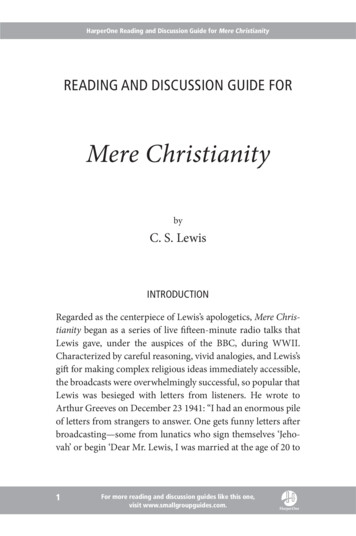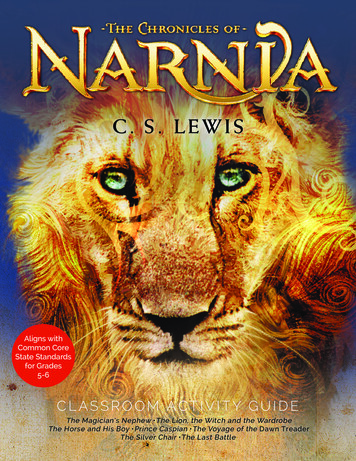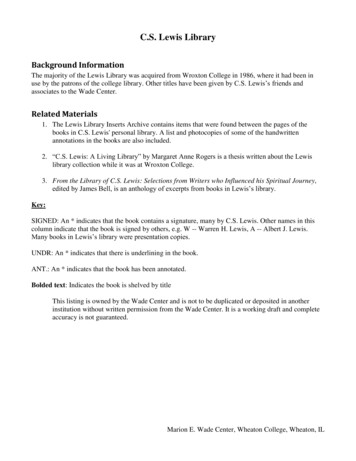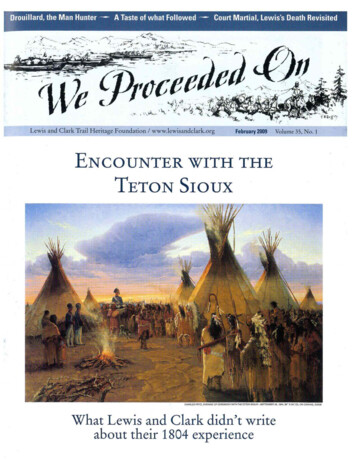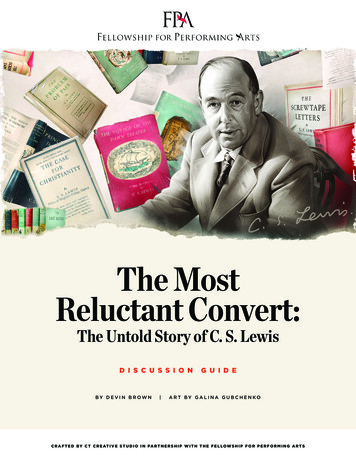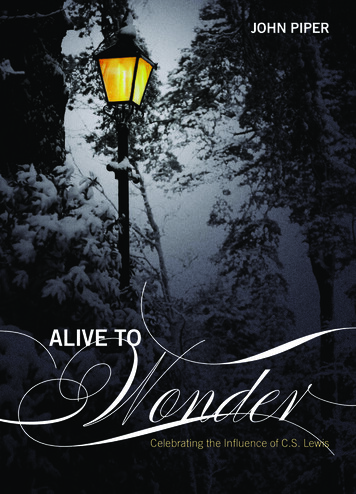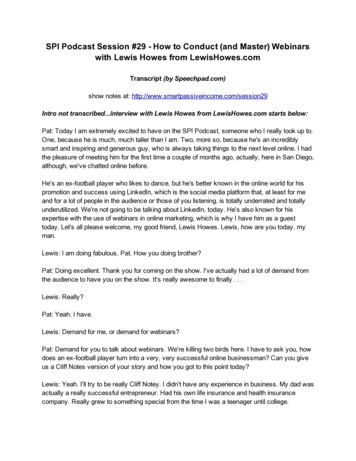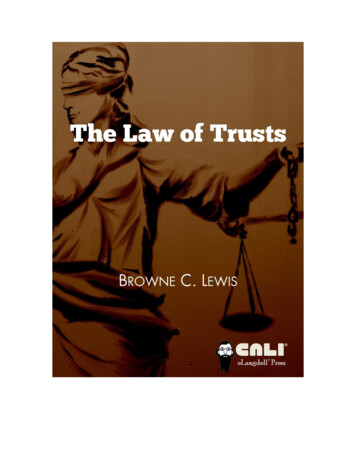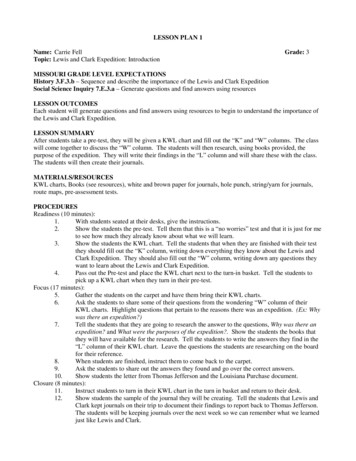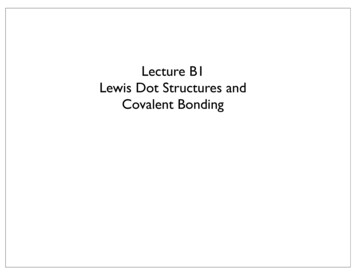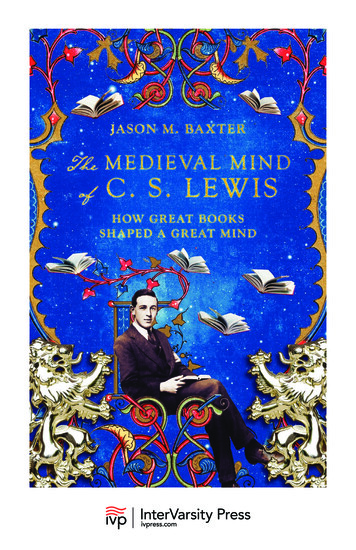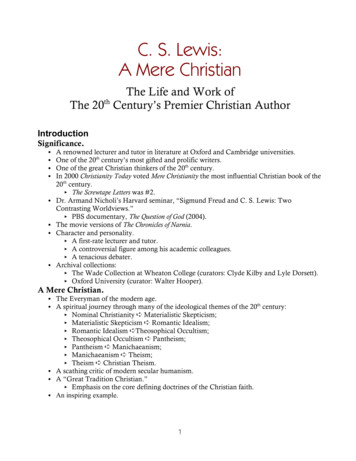
Transcription
C. S. Lewis:A Mere ChristianThe Life and Work ofThe 20th Century’s Premier Christian AuthorIntroductionSignificance.CCCCCCCCA renowned lecturer and tutor in literature at Oxford and Cambridge universities.One of the 20th century’s most gifted and prolific writers.One of the great Christian thinkers of the 20th century.In 2000 Christianity Today voted Mere Christianity the most influential Christian book of the20th century. The Screwtape Letters was #2.Dr. Armand Nicholi’s Harvard seminar, “Sigmund Freud and C. S. Lewis: TwoContrasting Worldviews.” PBS documentary, The Question of God (2004).The movie versions of The Chronicles of Narnia.Character and personality. A first-rate lecturer and tutor. A controversial figure among his academic colleagues. A tenacious debater.Archival collections: The Wade Collection at Wheaton College (curators: Clyde Kilby and Lyle Dorsett). Oxford University (curator: Walter Hooper).A Mere Christian.C The Everyman of the modern age.C A spiritual journey through many of the ideological themes of the 20th century: Nominal Christianity - Materialistic Skepticism; Materialistic Skepticism - Romantic Idealism; Romantic Idealism -Theosophical Occultism; Theosophical Occultism - Pantheism; Pantheism - Manichaeanism; Manichaeanism - Theism; Theism - Christian Theism.C A scathing critic of modern secular humanism.C A “Great Tradition Christian.” Emphasis on the core defining doctrines of the Christian faith.C An inspiring example.1
C. S. Lewis: A Mere Christian2A Most Reluctant ConvertBreaking Down Barriers.C The Christian influence. CSL: “All the books were turning against me. Indeed, I must have been as blind as a batnot to have seen, long before, the ludicrous contradiction between my theory of life andmy actual experiences as a reader. George MacDonald had done more to me than anyother writer;. Chesterton had more sense than all the other moderns put together.“But the most alarming of all was George Herbert. Here was a man who seemedto me to exceed all the authors I had read in conveying the very quality of life as weactually live it from moment to moment; but the wretched fellow, instead of doing it alldirectly, insisted on mediating it through what I called ‘the Christian mythology.’ On theother hand, most of the authors who might be claimed as precursors of modernenlightenment seemed to me [quite puny by comparison] and bored me. The only nonChristians who seemed to me really to know anything were the Romantics; and a goodmany of them were tinged with something like religion, even at times with Christianity. [Iwas drawn to the conclusion that] ‘Christians are wrong but all the rest are bores.’”C An anti-Christian bias.C The reality of the supernatural. William Butler Yeats. “A ravenous, erotic lust” for the Occult. Dr. Askins.Spiritual Checkmate.C Spiritual deadends.C Is Christianity true?C The influence of friends and acquaintances. Arthur Greeves. Owen Barfield. Alan Griffiths. Nevill Coghill. J. R. R. Tolkien. Hugo Dyson. Paul Victor Mendelssohn Benecke.C G. K. Chesterton’s The Everlasting Man.C Immersion in a medieval worldview CSL: “A young atheist cannot guard his faith too carefully. Dangers lie in wait for him onevery side.”C A random thought: T. D. “Harry” Weldon: “Rum thing, that stuff of Frazer’s about the Dying God.It almost looks as if it really happened once.”C Investigating the evidence.C Drawn to the church.C The turning point. A.N. Wilson: “He began to feel himself approached by God, and in the summer of 1929went through a mystical experience.” Lewis unbound.
C. S. Lewis: A Mere Christian3C A life-changing confession: CSL: “Remember, I had always wanted, above all things, not to be ‘interfered with.’ I hadwanted ‘to call my soul my own.’ I had been far more anxious to avoid suffering than toachieve delight.“You must picture me alone in that room in Magdalen, night after night, feeling,whenever my mind lifted even for a second from my work, the steady, unrelentingapproach of Him whom I so earnestly desired not to meet.“[Finally,] I gave in, and admitted that God was God, and knelt and prayed:perhaps, that night, the most dejected and reluctant convert in all England.”Jesus Is the Way.C Struggling with church. CSL: “My churchgoing was a merely symbolical and provisional practice. If it in facthelped to move me in the Christian direction, I am unaware of this.”C A perplexing question.C A nighttime conversion with Tolkien and Dyson.C The Christian myth.C Lewis’ “imaginative failure.”C The Christian story as “true myth.” The fundamental difference: It really happened! CSL: “What flows into you from myth is not truth but reality. and therefore every mythbecomes the father of innumerable truths on the abstract level.”C Christianity works.C Lewis’ magical motorcycle ride: CSL: “When we set out I did not believe that Jesus Christ is the Son of God, and whenwe reached the zoo I did.” CSL: “I have just passed on from believing in God to definitely believing in Christ.”C Joy fulfilled. CSL: “The man who has passed through [a profound conversion experience] feels likeone who has waked from a nightmare into ecstasy.”Growth and Discipleship.C Practicing the spiritual disciplines. Thomas a Kempis’ Imitation of Christ.C A demonstrable effect. George Sayer: “Jack’s conversion to Christianity made him a different person. Hissearch for belief was over; he now had a strong platform on which to stand. He devotedhimself to developing and strengthening his belief, and almost from the year of hisconversion, he wanted to become an evangelist for the Christian faith.” An exemplary life.C Post-script: Mrs. Moore’s reaction. A.N. Wilson: “Lewis was not a man to say one thing and do another. He meant hisChristian commitment to be total.”
C. S. LewisBibliographyJohn Beversluis, C. S. Lewis and the Search for Rational Religion (Eerdmans, 1985).John Beversluis, “Beyond the Double-Bolted Door.” Christian History (Vol. 4, No. 3, 1985),pp. 28-31.John Beversluis, “Surprised by Freud: A Critical Appraisal of A. N. Wilson’s Biography of C. S.Lewis.” Christianity and Literature (Vol. 41, No. 2, 1992), pp. 179-95.Humphrey Carpenter, The Inklings (Allen & Unwin, 1978).Christopher Derrick, C. S. Lewis and the Church of Rome. Xxxx.Christopher Derrick, “Putting C. S. Lewis On the Couch.” New Oxford Review (May, 1990).C A critical review of A. N. Wilson’s C. S. Lewis: A Biography.David C. Downing, Into the Region of Awe: Mysticism in C. S. Lewis (IVP, 2005).Paul Holmer, Xxxx. Xxxx.C A brilliant study of Lewis’ faith.David Holbrook, The Skeleton in the Wardrobe.C A skeptical psycho-biography by an atheist.Walter Hooper, C. S. Lewis Companion and Guide (HarperCollins, 1998).Thomas Howard, Xxxxx. Xxxx.Clyde Kilby, The Christian World of C. S. Lewis (Eerdmans, 1995).Peter Kreeft, C. S. Lewis For the Third Millenium (Ignatius Press, 1994).Art Lindsley, C. S. Lewis’s Case For Christ: Insights from Reaon, Imagination and Faith (IVP,2005).Louis A. Markos, “Myth Matters.” Christianity Today (April 23, 2001).Victor Reppert, “Taking C. S. Lewis Seriously.” Books & Culure (Sep/Oct 2003), pp. 12-15.Victor Reppert, C. S. Lewis’s Dangerous Idea (Inter-Varsity Press, 2003).George Sayer, Jack: C. S. Lewis and His Times (Harper & Row, 1988).C Sheldon Vanauken: “This is the best book written about C.S. Lewis.”C Lyle Dorsett: Of all the Lewis biographies, “this one by Sayer is superior to all the others forseveral reasons. First, he knew Lewis better and for more years than other biographers.Second, he knew Lewis in a variety of contexts [first as a student at Magdalen College andlater as a friend and colleague]. And finally he knew Joy [Davidman Gresham] and her sons,as well as many of the famous writer’s relatives and friends.”Brian Sibley, C. S. Lewis Through the Shadowlands (Baker/Revell, 1999).Sheldon Vanauken, “The Best Book Written About C. S. Lewis.” New Oxford Review (Dec. 1988).C A review of George Sayer’s Jack: C. S. Lewis and His Times.Chad Walsh, Literary Legacy. Xxxx.A.N. Wilson, C. S. Lewis: A Biography (W. W. Norton, 1990.C A generally sympathetic but critical psycho-biography – more balanced than Holbrook’s.4
C. S. LewisA ChronologyYearLife18981908Born in Belfast, Northern Ireland.Flora Lewis dies.Sent to Wynyard boarding school in England.Enrolls at Cherbourg Academy in Malvern, England.Enrolls in Malvern College.Begins a 2-year course of study under WilliamKirkpatrick.Reads George MacDonald’s Phantastes.Enrolls in University College of Oxford University.Befriends Paddy Moore and Janis (“Minto”) Moore.Enlists in the army and is sent to France.Wounded on the battlefield (April).Reads G.K. Chesterton.Begins a relationship with Mrs. Moore.Returns to University College.Meets William Butler Yeats.Appointed to the faculty of Magdalen College.Befriends J.R.R. Tolkien.Albert Lewis dies.Disavowal of atheism.Jack, Warnie, and Mrs. Moore purchase The Kilns.Conversion to Christianity (September).Organizes The Inklings with J.R.R. Tolkien, HugoDyson, Charles Williams, et al.Tolkien begins writing The ts in BondageDymerThe Pilgrim’s RegressThe Allegory of LoveThe Discarded Image: AnIntroduction to Medieval andRenaissance LiteratureOut of the Silent PlanetJoins the Home Guard.Tolkien begins writing The Lord of the Rings.BBC lectures: “The Christian Faith As I See It –By a Layman”(Book I of Mere Christianity).5The Problem of PainThe Screwtape Letters
YearLifePublications1942BBC lectures: “What Christians Believe” and“Christian Behavior” (Books II and III of MereChristianity).Organizes The Socratic Club at Oxford.June Flewett lives at The Kilns.Riddell Memoral Lectures (later published as TheAbolition of Man, February).BBC lectures: “Beyond Personality” (Book IV ofMere Christianity).A Preface to “Paradise Lost”194319441945194619471948Awarded Honorary Doctor of Divinity by theUniversity of St. Andrews.1955195619591960196119621963The Abolition of ManThat Hideous StrengthThe Great DivorceMiraclesElected Fellow of Royal Society of Literature.Debate with Elizabeth Anscombe.1950195119521954PerelandraThe Lion, the Witch, and theWardrobeMrs. Moore dies.Meets Joy Davidman Gresham.Accepts chair of Medieval and Renaissance Englishat Cambridge University.Marries Joy Gresham (April).Joy suffers first bout with cancer (October).Awarded Doctor of Letters by ManchesterUniversity.Joy dies (July).Diagnosed with inoperable cancer (June).Suspends teaching (October).Awarded Hononary Doctorate by the University ofDijon.Awarded Honorary Doctorate by the University ofLyon.Suffers heart attack (July).Dies (November 22, 1963).Mere ChristianityEnglish Literature in the SixteenthCenturySurprised by JoyTill We Have FacesThe Four LovesA Grief ObservedThe Discarded ImageLetters to Malcolm
Encountering “The Great Knock”C. S. Lewis(Excerpted from Surprised By Joy, Chapter IX)[NOTE: At this point in his autobiography, Lewis is fifteen years old. He has justleft boarding school and has traveled by train to meet his new private tutor,William Kirkpatrick, under whom his father had studied many years earlier.]At Bookham I was met by my newteacher – “Kirk” or “The Great Knock” asmy father and I called him. I had heardabout him all my life and I therefore[thought I] had a very clear impression ofwhat I was in for.He was over six feet tall, very shabbilydressed (like a gardener, I thought).We shook hands, and though his gripwas like iron pincers it was not lingering.A few minutes later we were walkingaway from the station.“You are now,” said Kirk, “proceedingalong the main artery between Great andLittle Bookham.”I stole a glance at him. I began to“make conversation” in the deplorablemanner which I had acquired at eveningparties. I said I was surprised at the“scenery” of Surrey; it was much “wilder”than I had expected.“Stop!” shouted Kirk with a suddennessthat made my jump. “What do you meanby wildness and what grounds had you fornot expecting it?”I replied that I didn’t know what, still“making conversation.” As answer afteranswer was torn to shreds it at last dawnedupon me that he really wanted to know.He was not making conversation, notjoking, nor snubbing me; he wanted toknow. I was stung into attempting a realanswer.A few passes sufficed to show that Ihad no clear and distinct ideacorresponding to the word “wildness,” andthat, in so far as I had any idea at all,“wildness” was a totally inept word.“Do you not see, then,” concluded theGreat Knock, “that your remark wasmeaningless?” I prepared to sulk a little,assuming that the subject would bedropped. Never was I more mistaken inmy life. Having analyzed my terms, Kirkwas proceeding to deal with myproposition as a whole. On what had Ibased (but he pronounced it baized) myexpectations about the flora and geologyof Surrey? Was it maps, or photographs,or books? I could produce none. It had,heaven help me, never occurred to me thatwhat I called my thoughts needed to be“baized” on anything. Kirk once moredrew a conclusion – without the slightestsign of emotion, but equally without theslightest concession to what I thoughtgood manners: “Do you not see, then, thatyou had no right to have any opinionwhatever on the subject?”By this time our acquaintance hadlasted about three and a half minutes; butthe tone set by this first conversation waspreserved without a single break during allthe years I spent at Bookham. The mostcasual remark was taken as a summons todisputation.
Encountering “The Great Knock”Questions for Consideration1. If you had been Lewis, what would you have thought about Kirk’s response to your innocentcomment that the scenery around Surrey was much “wilder” than you had expected?.2. Was Kirk right or wrong to confront young Lewis as he did? Why or why not?.3. There is a common saying, “Everyone is entitled to his/her own opinion.” Do you agree thateveryone’s opinions are equally valid? If not, what should opinions and beliefs be based on?.4. What is the main point that Lewis is trying to make in relating this story?.5. Do you think Lewis considered his relationship with “the Great Knock” to be a generally positiveor negative influence on his personal growth and development? Why?.
As the Ruin Falls(C. S. Lewis / Phil Keaggy, 1976, Sandtree Music / Birdwing Music.Recorded by Phil Keaggy)All this is flashy rhetoric about loving youI never had a selfless thought since I was bornI am mercenary and self-seeking through and throughI want God, you, all friends, merely to serve my terms.Peace, reassurance, pleasure are the goals I seekI cannot crawl one inch outside my proper skinI talk of love –A scholar’s parrot may talk Greek, but self-imprisonedAlways end where I begin.Only that now you have taught me, but how late my lackI see the chasmAnd everything you are was making my heart into a bridgeBy which I might get back from exile a grown manAnd now the bridge is breaking.For this I bless you as the ruin fallsThe pains you give me are more precious than all other gains.
C In 2000 Christianity Today voted Mere Christianity the most influential Christian book of the 20th century. The Screwtape Letters was #2. C Dr. Armand Nicholi's Harvard seminar, "Sigmund Freud and C. S. Lewis: Two Contrasting Worldviews." PBS documentary, The Question of God (2004). C The movie versions of The Chronicles of Narnia.
